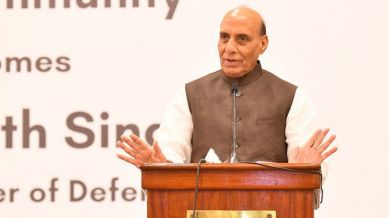Stay updated with the latest - Click here to follow us on Instagram
Warfare now measured in hours and seconds, not months, says Rajnath Singh
Satellites, drones, sensors redefining nature of conflict: Minister at coast guard conference

Defence Minister Rajnath Singh Monday said warfare is now measured in hours and seconds, not months, as satellites, drones and sensors redefine the nature of conflict.
At the Indian Coast Guard (ICG) Commanders’ Conference in Delhi, which started on Sunday and ends Tuesday, he urged the coast guard to develop a futuristic roadmap that anticipates new challenges, integrates cutting-edge technologies and continuously adapts strategies.
monthly limit of free stories.
with an Express account.
He also said cyber and electronic warfare are no longer hypothetical threats but present-day realities.
“A nation may attempt to paralyse our systems not with missiles, but through hacking, cyber-attacks and electronic jamming,” Singh said.
He added that the ICG must continuously adapt, upgrade its training and equipment to guard against such threats, underlining that automated surveillance networks and AI-enabled systems are essential to reduce response times to seconds and ensure readiness at all times.
Highlighting that India’s 7,500-km coastline, along with island territories such as the Andaman and Nicobar Islands and Lakshadweep, poses enormous challenges, the minister said this requires advanced technology, well-trained personnel and round-the-clock surveillance, while maritime threats are becoming increasingly technology-driven and multi-dimensional.
Singh said once predictable patterns of smuggling or piracy have now evolved into sophisticated operations using GPS spoofing, remote-controlled boats, encrypted communications, drones, satellite phones and even networks operating on the dark web, adding that terrorist organisations exploit modern tools, such as digital mapping and real-time intelligence, to plan their activities.
He said traditional methods are no longer sufficient, and there is a need to be ahead of criminals and adversaries by integrating artificial intelligence, machine learning-based surveillance, drones, cyber-defence systems and automated response mechanisms into our maritime security framework.
Singh said ICG is a vital pillar of national security that has transformed itself from a modest fleet at inception into a “formidable force” with 152 vessels and 78 aircraft.
Since its establishment, the ICG has apprehended 1,638 foreign vessels and 13,775 foreign fishermen involved in illegal activities within Indian waters, the Defence Ministry said in a statement.
The statement said the ICG has also seized 6,430 kilograms of narcotics, valued at Rs 37,833 crore and has been effective in combating transnational maritime crime.
The ICG has conducted 76 search and rescue (SAR) operations till July this year, saving 74 lives, and a cumulative record of over 14,500 lives rescued in disaster response operations.
“Whether it is responding to cyclones, oil spills, industrial accidents, or foreign vessels in distress, ICG has always acted swiftly to protect lives and property. The world judges India by how we act in such crises, and the ICG has consistently brought us honour,” the defence minister said.
He further said that by patrolling the Exclusive Economic Zone (EEZ), the ICG not only deters external threats but also addresses illegal fishing, drug and arms trafficking, smuggling, human trafficking, marine pollution and irregular maritime activities.
Singh said that while land boundaries are permanent, clearly marked and relatively predictable, maritime borders are fluid and constantly shifting due to tides, waves and weather.
“A smuggling vessel may look like a fishing boat, a terrorist group may exploit the openness of the sea, and threats may emerge invisibly. Maritime security is far more complex and unpredictable than land borders and demands constant vigilance,” he said.
Referring to developments in Myanmar, Bangladesh, Nepal and other countries in the region that impact coastal security, especially in the Bay of Bengal, he urged the ICG to maintain not just routine surveillance but also geopolitical awareness and readiness to respond swiftly to external developments.
He said a disruption in maritime trade, whether physical or cyber, can have cascading effects on security and economy and that national security and economic security should be treated as the same.
He added: “Preparedness, adaptability and rapid response must be the cornerstones of the ICG’s vision.”